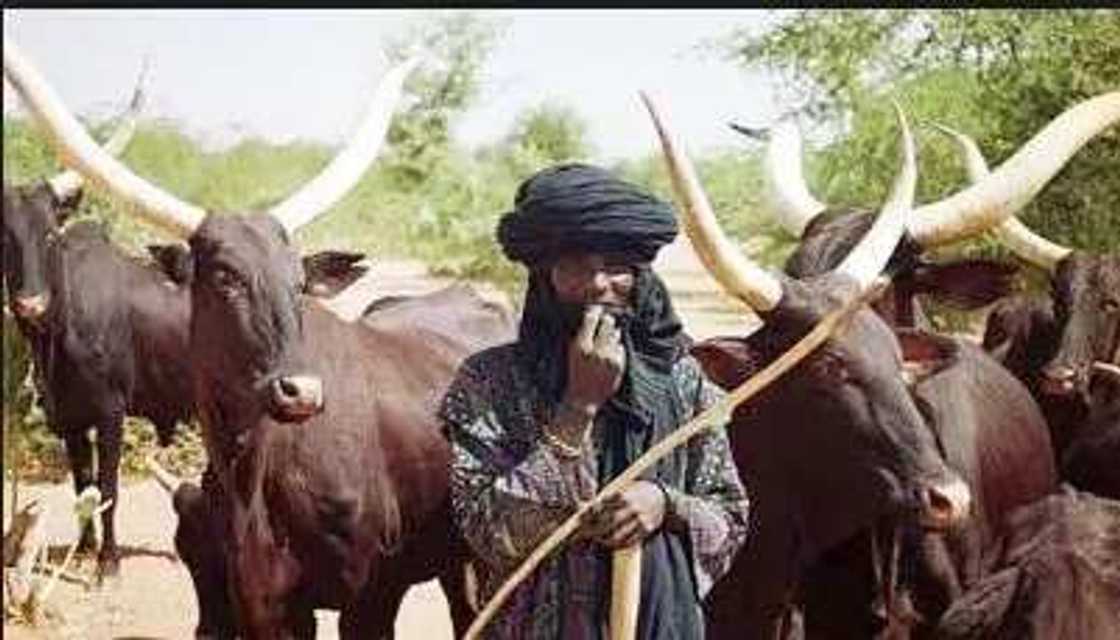Fulani herdsmen and farmers clash gets worse as drought kicks in
- The constant clashes between Fulani herdsmen and farmers in Nigeria is already a major national crisis
- Farmers have accused the herdsmen of trespassing on their farmland to graze their cattle, destroying their crops
- The Fulani herdsmen have always ventured in search of land on which to feed their cattle
A report by The Guardian UK indicates that farmers have taken to burning their land after they’ve collected the harvest to deny passing Fulani herdsmen farmland to graze on.

According to the report, the farmers have taken this extreme measure, despite the fact that it damages the soil.
The combined effect of competition for land and droughts has made the search of Fulani herdsmen increasingly desperate.
Coupled with the fact that their cattle are sometimes stolen by criminal groups and aggrieved communities.
But the conflict has been deadly for farming communities, the report stated.
Thousands of people in various regions in Nigeria have been killed by the rampaging herdsmen.
READ ALSO: Christians on the verge of war with Muslims, FG reacts
The perennial conflict, for years confined mainly to “middle-belt” states, has now spread around the country, with mass killings increasingly reported in southern states over the past year.
In Plateau state, where such conflict has a long history, some locals feel the attacks are part of an effort to get farming communities to leave their land, allowing the herdsmen to settle without competition for resources.
“That’s why they attack villages – they don’t just attack because of quarrels with villagers,” said a farmer who did not want to be named. “They burn homes and farms so that we will have to start again somewhere else. But we can’t, and will not leave because this is our land.”
According to John Reginald, a worker from Nigeria-based NGO Crudan, the attacks have met little resistance from police or the military.
“This crisis has been able to go on partly because there is very little security present in village communities, and attacks in rural fields are hard to police.
“So most times when the herdsmen attack, or when these issues take place, by the time people hear about it, it’s too late to stop” John Reginald, an NGO worker said.
According to the World Bank, 52% of Nigerians still live in rural areas, where people are most vulnerable to sporadic, sustained attacks.
The federal government’s response to the crisis has been widely criticised by Nigerians as inadequate.
To make matters worse, the killings have been viewed as motivated along religious and ethnic lines. President Muhammadu Buhari’s ethnicity – he is a Fulani Muslim – has fed accusations that the government is reluctant to confront a group it has sympathies with.
A plan by the federal government to allocate grazing reserves was rejected last year by the National Assembly.
Some states such as Ekiti and Abia are passing legislation to allow them to limit the herdsmen’s activities, and prosecute those who graze on private land.
In Kaduna, the state government has admitted to having paid compensation to aggrieved herdsmen to stop further killings.
In some cases, farmers have taken to burning their land after they’ve collected the harvest – to deny passing herdsmen farmland to graze on – despite the fact that it damages the soil.
The effects of the conflict on communities, particularly across the north-east, has sharply decreased crop yields.
The crisis has had a significant impact in Adamawa, a state with already stretched resources due to the huge influx of Internal Displaced Persons.
READ ALSO: CAN leadership fears Buhari may be in support of killings in southern Kaduna following his silence
The number of people reliant on land to farm for food is increasing just when climate change has made farming more difficult. As a result, the land disputes with the herdsmen are likely to increase.
Despite the many deaths and federal government statements, there is little sign of the crisis coming to an end.
A farmer said: “All we can do is manage with what we can farm, it is a bad situation, but we are powerless to stop it because they are armed and we are not.”
Source: Legit.ng


